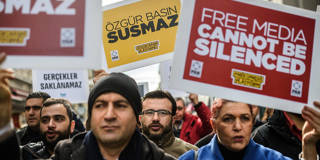Transparency is the missing ingredient in large media platforms today, with everyone in the dark about how proprietary algorithms sort people and prioritize messages. This should not lead us to condemn all social media, but we should be sensitive to how owners and authoritarians use them.
BERLIN – Donald Trump’s presidency was bookended by the White House pushing “alternative facts” about the size of the crowd at Trump’s inauguration at the US Capitol and his violent supporters scrawling “Murder the Media” on the Capitol’s doors. While Trump is gone (for now), professional media remain at risk – and not just in the United States. The watchdog group Reporters Without Borders (RSF) considers the state of press freedom “good” in a mere 12 countries – fewer than ever before.
The most obvious threat to press freedom around the world emanates from authoritarian regimes, some of which have doubled down on restricting the press to prevent reporting on political leaders’ failings during the pandemic. In Hungary, which slipped to 92nd place in RSF’s world ranking of press freedom, from 89th place last year, the government has threatened media outlets with prosecution for “blocking” the government’s efforts to fight COVID. Nurses and doctors are barred from speaking to independent journalists.
Authoritarian regimes are also refining less obvious techniques to limit media pluralism. They withhold state advertising (which has often increased during the pandemic) from outlets that are critical of them. They enable businessmen friendly to the regime to buy up media, as has happened in Turkey, where construction oligarchs who have benefited from the recent building boom are repaying political debts to President Recep Tayyip Erdoğan by taking over independent newspapers.

BERLIN – Donald Trump’s presidency was bookended by the White House pushing “alternative facts” about the size of the crowd at Trump’s inauguration at the US Capitol and his violent supporters scrawling “Murder the Media” on the Capitol’s doors. While Trump is gone (for now), professional media remain at risk – and not just in the United States. The watchdog group Reporters Without Borders (RSF) considers the state of press freedom “good” in a mere 12 countries – fewer than ever before.
The most obvious threat to press freedom around the world emanates from authoritarian regimes, some of which have doubled down on restricting the press to prevent reporting on political leaders’ failings during the pandemic. In Hungary, which slipped to 92nd place in RSF’s world ranking of press freedom, from 89th place last year, the government has threatened media outlets with prosecution for “blocking” the government’s efforts to fight COVID. Nurses and doctors are barred from speaking to independent journalists.
Authoritarian regimes are also refining less obvious techniques to limit media pluralism. They withhold state advertising (which has often increased during the pandemic) from outlets that are critical of them. They enable businessmen friendly to the regime to buy up media, as has happened in Turkey, where construction oligarchs who have benefited from the recent building boom are repaying political debts to President Recep Tayyip Erdoğan by taking over independent newspapers.